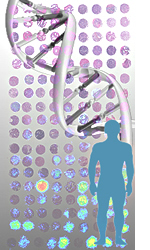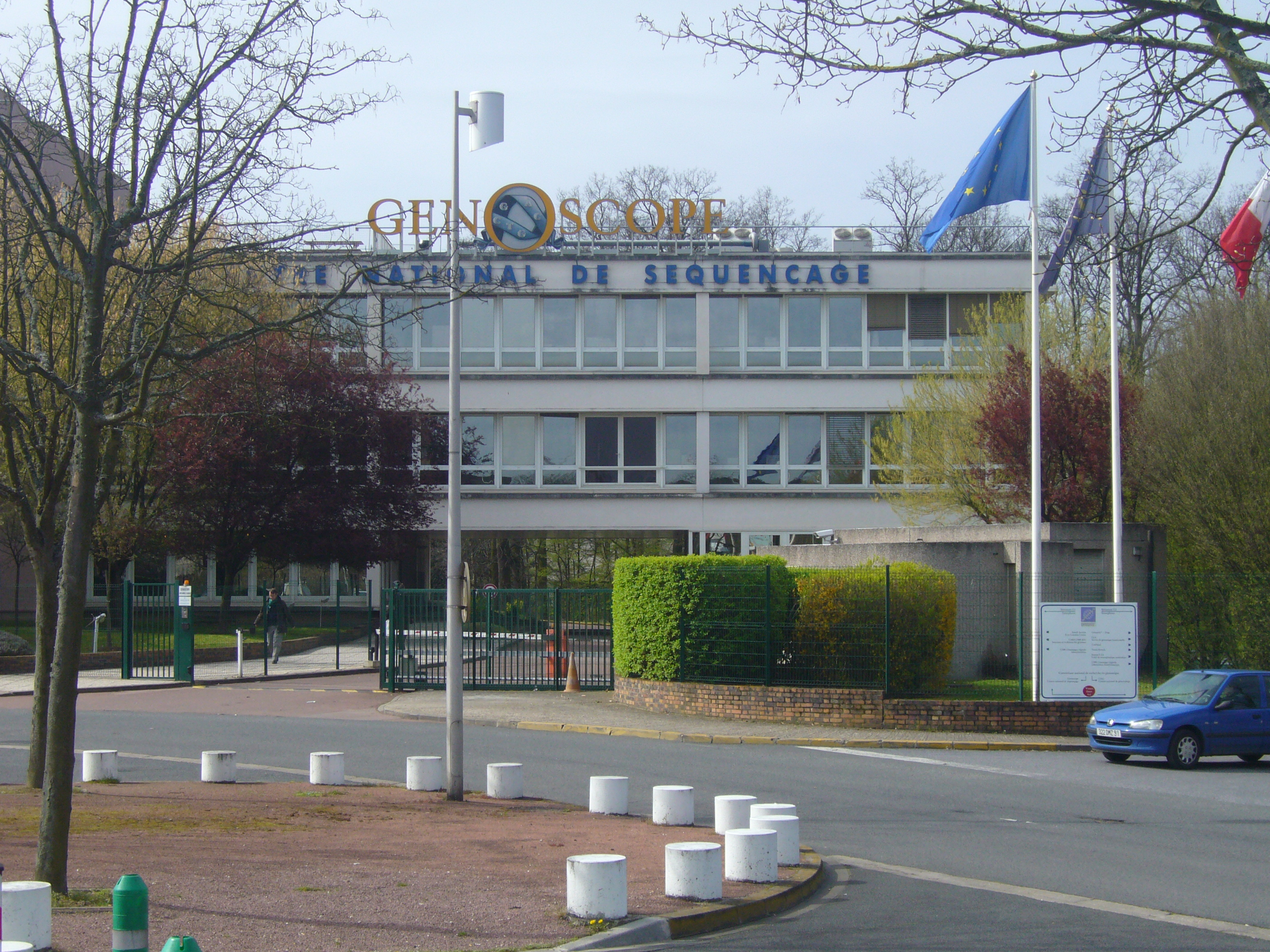|
GeneSweep
GeneSweep or Gene Sweepstake was a sweepstake and scientific wager for scientists to bet on the total number of genes in the human genome. The sweepstake was started at a Cold Spring Harbor Laboratory conference in 2000. Initially, bets could be placed for $1, which was raised to $5 in 2001 and to $20 in 2002. The cost of placing a bet increased significantly because later participants were expected to have much more accurate information available to inform their guesses. By May 23, 2000, 228 bets had been placed, with the average number of predicted genes among them being 62,598. Winning bets in 2003 On May 30, 2003, Ewan Birney of the European Bioinformatics Institute, who had organized the pool, announced the winner: Lee Rowen of the Institute for Systems Biology. Rowen had guessed that the human genome would contain 25,947 genes, which was the closest to the estimated number of 24,847 given by the Ensembl genome database project Ensembl genome database project is a scienti ... [...More Info...] [...Related Items...] OR: [Wikipedia] [Google] [Baidu] |
Ewan Birney
John Frederick William Birney (known as Ewan Birney) (born 6 December 1972) is joint director of EMBL's European Bioinformatics Institute (EMBL-EBI), in Hinxton, Cambridgeshire and deputy director general of the European Molecular Biology Laboratory (EMBL). He also serves as non-executive director of Genomics England, chair of the Global Alliance for Genomics and Health (GA4GH) and honorary professor of bioinformatics at the University of Cambridge. Birney has made significant contributions to genomics, through his development of innovative bioinformatics and computational biology tools. He previously served as an associate faculty member at the Wellcome Trust Sanger Institute. Education Birney was educated at Eton College as an Oppidan Scholar. Before going to university, Birney completed a gap year internship at Cold Spring Harbor Laboratory supervised by James Watson and Adrian Krainer. Birney completed his Bachelor of Arts degree in Biochemistry at the University of ... [...More Info...] [...Related Items...] OR: [Wikipedia] [Google] [Baidu] |
Scientific Wager
A scientific wager is a wager whose outcome is settled by scientific method. They typically consist of an offer to pay a certain sum of money on the scientific proof or disproof of some currently-uncertain statement. Some wagers have specific date restrictions for collection, but many are open. Wagers occasionally exert a powerful galvanizing effect on society and the scientific community. Notable scientists who have made scientific wagers include Stephen Hawking and Richard Feynman. Stanford Linear Accelerator has an open book containing about 35 bets in particle physics dating back to 1980; many are still unresolved. Notable scientific wagers * In 1870, Alfred Russel Wallace bet a flat-Earth theorist named John Hampden that he could prove the flat Earth hypothesis incorrect. The sum staked was £500 (equivalent to about £ in present-day terms). A test (now known as the Bedford Level experiment) involving a stretch of the Old Bedford River, in Norfolk, was agreed on: Wa ... [...More Info...] [...Related Items...] OR: [Wikipedia] [Google] [Baidu] |
Sweepstake
A sweepstake is a type of contest where a prize or prizes may be awarded to a winner or winners. Sweepstakes began as a form of lottery that were tied to products sold. In response, the FCC and FTC refined U.S. broadcasting laws (creating the anti-lottery laws). Under these laws sweepstakes became strictly "No purchase necessary to enter or win" and "A purchase will not increase your chances of winning", especially since many sweepstakes companies skirted the law by stating only "no purchase necessary to enter", removing the consideration (one of the three legally required elements of gambling) to stop abuse of sweepstakes. Today, sweepstakes in the United States are used as marketing promotions to reward existing consumers and to draw attention to a product. By definition, the winner is determined by pure random chance rather than skill. Marketing Sweepstakes with large grand prizes tend to attract more entries regardless of the odds of winning. Therefore, the value of smal ... [...More Info...] [...Related Items...] OR: [Wikipedia] [Google] [Baidu] |
The New York Times
''The New York Times'' (''the Times'', ''NYT'', or the Gray Lady) is a daily newspaper based in New York City with a worldwide readership reported in 2020 to comprise a declining 840,000 paid print subscribers, and a growing 6 million paid digital subscribers. It also is a producer of popular podcasts such as '' The Daily''. Founded in 1851 by Henry Jarvis Raymond and George Jones, it was initially published by Raymond, Jones & Company. The ''Times'' has won 132 Pulitzer Prizes, the most of any newspaper, and has long been regarded as a national "newspaper of record". For print it is ranked 18th in the world by circulation and 3rd in the U.S. The paper is owned by the New York Times Company, which is publicly traded. It has been governed by the Sulzberger family since 1896, through a dual-class share structure after its shares became publicly traded. A. G. Sulzberger, the paper's publisher and the company's chairman, is the fifth generation of the family to head the p ... [...More Info...] [...Related Items...] OR: [Wikipedia] [Google] [Baidu] |
Human Genetics
Human genetics is the study of inheritance as it occurs in human beings. Human genetics encompasses a variety of overlapping fields including: classical genetics, cytogenetics, molecular genetics, biochemical genetics, genomics, population genetics, developmental genetics, clinical genetics, and genetic counseling. Genes are the common factor of the qualities of most human-inherited traits. Study of human genetics can answer questions about human nature, can help understand diseases and the development of effective treatment and help us to understand the genetics of human life. This article describes only basic features of human genetics; for the genetics of disorders please see: medical genetics. Genetic differences and inheritance patterns Inheritance of traits for humans are based upon Gregor Mendel's model of inheritance. Mendel deduced that inheritance depends upon discrete units of inheritance, called factors or genes. Autosomal dominant inheritance Autosomal ... [...More Info...] [...Related Items...] OR: [Wikipedia] [Google] [Baidu] |
Genome Biology
''Genome Biology'' is a peer-reviewed open access scientific journal covering research in genomics. It was established in 2000 and is published by BioMed Central. The chief editor is currently Andrew Cosgrove ( BioMed Central, New York). Abstracting and indexing The journal is abstracted and indexed in: According to the ''Journal Citation Reports'', the journal has a 2019 impact factor The impact factor (IF) or journal impact factor (JIF) of an academic journal is a scientometric index calculated by Clarivate that reflects the yearly mean number of citations of articles published in the last two years in a given journal, as ... of 10.806. References External links * BioMed Central academic journals Genetics in the United Kingdom Genetics journals Genomics journals Creative Commons Attribution-licensed journals Online-only journals {{genetics-journal-stub ... [...More Info...] [...Related Items...] OR: [Wikipedia] [Google] [Baidu] |
Nature (journal)
''Nature'' is a British weekly scientific journal founded and based in London, England. As a multidisciplinary publication, ''Nature'' features peer-reviewed research from a variety of academic disciplines, mainly in science and technology. It has core editorial offices across the United States, continental Europe, and Asia under the international scientific publishing company Springer Nature. ''Nature'' was one of the world's most cited scientific journals by the Science Edition of the 2019 '' Journal Citation Reports'' (with an ascribed impact factor of 42.778), making it one of the world's most-read and most prestigious academic journals. , it claimed an online readership of about three million unique readers per month. Founded in autumn 1869, ''Nature'' was first circulated by Norman Lockyer and Alexander Macmillan as a public forum for scientific innovations. The mid-20th century facilitated an editorial expansion for the journal; ''Nature'' redoubled its efforts in ... [...More Info...] [...Related Items...] OR: [Wikipedia] [Google] [Baidu] |
Science (journal)
''Science'', also widely referred to as ''Science Magazine'', is the peer-reviewed academic journal of the American Association for the Advancement of Science (AAAS) and one of the world's top academic journals. It was first published in 1880, is currently circulated weekly and has a subscriber base of around 130,000. Because institutional subscriptions and online access serve a larger audience, its estimated readership is over 400,000 people. ''Science'' is based in Washington, D.C., United States, with a second office in Cambridge, UK. Contents The major focus of the journal is publishing important original scientific research and research reviews, but ''Science'' also publishes science-related news, opinions on science policy and other matters of interest to scientists and others who are concerned with the wide implications of science and technology. Unlike most scientific journals, which focus on a specific field, ''Science'' and its rival ''Nature'' cover the full ra ... [...More Info...] [...Related Items...] OR: [Wikipedia] [Google] [Baidu] |
Jean Weissenbach
Jean may refer to: People * Jean (female given name) * Jean (male given name) * Jean (surname) Fictional characters * Jean Grey, a Marvel Comics character * Jean Valjean, fictional character in novel ''Les Misérables'' and its adaptations * Jean Pierre Polnareff, a fictional character from ''JoJo's Bizarre Adventure'' Places * Jean, Nevada, USA; a town * Jean, Oregon, USA Entertainment * Jean (dog), a female collie in silent films * "Jean" (song) (1969), by Rod McKuen, also recorded by Oliver * ''Jean Seberg'' (musical), a 1983 musical by Marvin Hamlisch Other uses * JEAN (programming language) * USS ''Jean'' (ID-1308), American cargo ship c. 1918 * Sternwheeler Jean, a 1938 paddleboat of the Willamette River See also *Jehan * * Gene (other) * Jeanne (other) * Jehanne (other) * Jeans (other) * John (other) John is a common English name and surname: * John (given name) * John (surname) John may also refer to: New Testa ... [...More Info...] [...Related Items...] OR: [Wikipedia] [Google] [Baidu] |
Genoscope
The French National Sequencing Center (Genoscope) was created in 1996 in Évry, France. It has been involved in the sequencing of the human genome The human genome is a complete set of nucleic acid sequences for humans, encoded as DNA within the 23 chromosome pairs in cell nuclei and in a small DNA molecule found within individual mitochondria. These are usually treated separately as the .... Details The Genoscope is a member of the CEA, and employs around 130 people. References Research institutes in France Biological research institutes {{genetics-stub ... [...More Info...] [...Related Items...] OR: [Wikipedia] [Google] [Baidu] |
Medical Research Council (United Kingdom)
The Medical Research Council (MRC) is responsible for co-coordinating and funding medical research in the United Kingdom. It is part of United Kingdom Research and Innovation (UKRI), which came into operation 1 April 2018, and brings together the UK's seven research councils, Innovate UK and Research England. UK Research and Innovation is answerable to, although politically independent from, the Department for Business, Energy and Industrial Strategy. The MRC focuses on high-impact research and has provided the financial support and scientific expertise behind a number of medical breakthroughs, including the development of penicillin and the discovery of the structure of DNA. Research funded by the MRC has produced 32 Nobel Prize winners to date. History The MRC was founded as the Medical Research Committee and Advisory Council in 1913, with its prime role being the distribution of medical research funds under the terms of the National Insurance Act 1911. This was a conseq ... [...More Info...] [...Related Items...] OR: [Wikipedia] [Google] [Baidu] |

.png)



